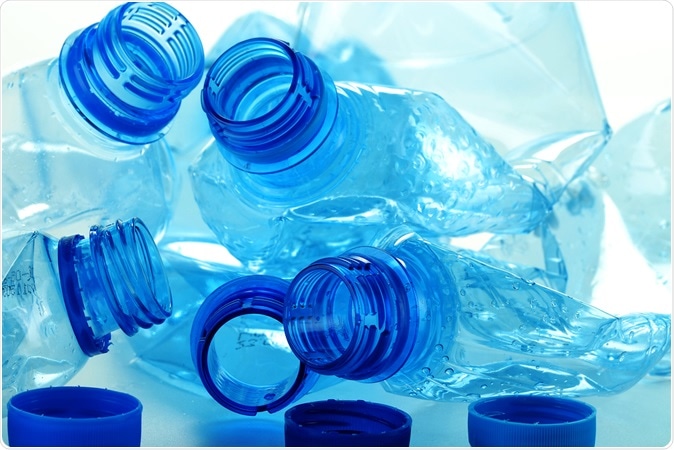We look for labels stating plastics are “BPA-free” to reassure ourselves that the product is safe to eat or drink out of. A new study has shown that BPA-free options are not safe either.
A team of researchers from the School of Molecular Biosciences at Washington State University tested BPA-free plastics on lab mice and found detrimental effects on their sperm counts and ova health.

Image Credit: Monticello / Shutterstock
BPA is short form for Bisphenol A that is used for packaging food and beverages. The chemical has been used since the 1960’s according to the US Food and Drugs Administration (US FDA). BPA was widely used to make polycarbonates or hard clear plastics that are commonly used to store and pack food items and beverages and also line the inner walls of these containers. When exposed to heat (for example from the microwave) or if the container is damaged, this chemical gets mixed with the food and can be ingested. In a report called the 2003-2004 National Health and Nutrition Examination Survey (NHANES III) that was released by the Centers for Disease Control and Prevention (CDC), experts found that such is the contamination of BPA in food and beverages, 93 percent of around 2,500 urine samples taken in the U.S. showed high levels of BPA.
BPA has been known to mimic the female hormone estrogen and thus it has been seen to alter the normal hormonal make up of the consumers especially if they are children. This same team of researchers around two decades back had shown the harmful effects of BPA on chromosomes of the eggs. The long term effects of BPA exposure are however not fully understood in humans. According to the US FDA website, “BPA is safe at the current levels occurring in foods.” Yet the potential for harm remains. The FDA thus has put a ban on use of BPA in infant formula packaging, sipper cups and feeding bottles for babies. The market has since then seen a deluge of BPA-free products used in plastic food and beverage containers.
In this new study lead author Patricia Hunt, a professor in the School of Molecular Biosciences at Washington State University and colleagues have found that BPA-free alternatives are also not as safe as believed. They tested these on lab mice to find problems of infertility among these animals. The researchers believe that this could hold true for humans as well. The study results were published in the latest issue of the journal Current Biology. Hunt said in a statement that the BPA-free alternatives and “many of these common replacements are not safe.”
The team kept the lab mice in BPA-free plastic cages and divided them into two groups. One of the groups of mice was administered BPA through a dropper while the other group did not receive BPA. To the surprise of the researchers, the animals that were not administered BPA (the control group) also started showing genetic changes that were seen in the BPA group. The team analyzed and noted that the control group of mice were actually exposed to bisphenol S or BPS that was present in the BPA-free cages as a BPA alternative. The cages of the control mice were cleaned inadvertently by a temporary worker using harsh detergents instead of the mild soaps. This caused damage to them and caused the BPS to leak out into the animal food and water. This BPS was also capable of altering the genes and causing problems associated with sperm and egg production and maturity.
As a next tem the team of researchers exposed mice to other BPA alternatives such as BPF, BPS and BPAF. The detrimental effects of all the alternatives remained same. The sperm and egg quality and quantity among the exposed animals continued to decline. These genetic changes that were introduced into the mice seemed to be passed on to future generations causing fertility problems in them as well.
According to a statement from Hunt, BPA or BPA-alternative “plastic products that show physical signs of damage or aging cannot be considered safe.”